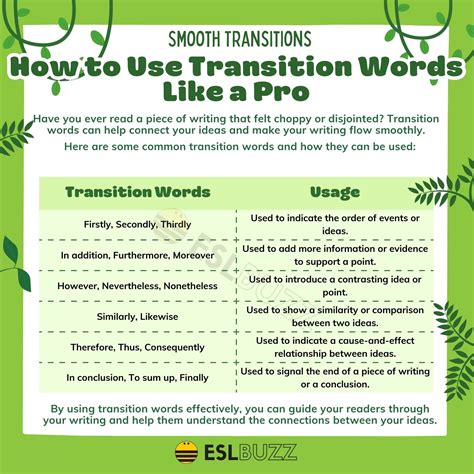Moreover, Transition Words Bridge the Gaps
Transition words are essential connectors that seamlessly link ideas, thoughts, and paragraphs within your writing. Their primary purpose is to create a coherent and logical flow of information, guiding readers effortlessly through your text.

In addition, Transition Words Enhance Clarity
These powerful words not only establish connections but also enhance the clarity and readability of your writing. By explicitly signaling the relationships between sentences and paragraphs, they ensure that your thoughts are conveyed in a clear and organized manner.
Consider the Purpose of Your Paragraph
Before selecting transition words, consider the purpose of the following paragraph. Whether it is to introduce a new concept, provide evidence, or expand on an existing idea, choose words that best convey your intended direction.
Examples of Transition Words for Different Purposes
| Transition Word | Purpose |
|---|---|
| Firstly, Secondly, Thirdly | Introduce a series of points |
| For example, For instance | Provide specific examples |
| In addition, Furthermore | Add related information |
| In contrast, On the contrary | Express opposing views |
| Therefore, Consequently | Draw conclusions or state results |
Examples of Transition Words for Different Paragraph Types
| Transition Word | Paragraph Type |
|---|---|
| To begin with, First of all | Introduces an opening paragraph |
| Moreover, In addition | Adds information to a supporting paragraph |
| In comparison, Conversely | Compares and contrasts different ideas |
| Finally, In conclusion | Summarizes and concludes the writing |
Vary Your Choices
Avoid overusing the same transition words repeatedly. Explore a diverse range of options to maintain interest and enhance the effectiveness of your writing.
Place Transition Words Strategically
Position transition words at the beginning of sentences or paragraphs to establish clear connections. They can also be used within sentences to smooth transitions between ideas.
Use Transition Words to Build Emphasis
Employed strategically, transition words can draw attention to key points or emphasize important ideas. For instance, using “most importantly” or “crucially” can highlight the significance of a particular statement.
Transition words are indispensable tools for crafting coherent, engaging, and informative writing. By understanding their purpose and applying them effectively, you can enhance the readability, clarity, and overall impact of your writing. Embrace their transformative power and unlock the potential for seamless transitions that guide readers effortlessly through your thoughts.
